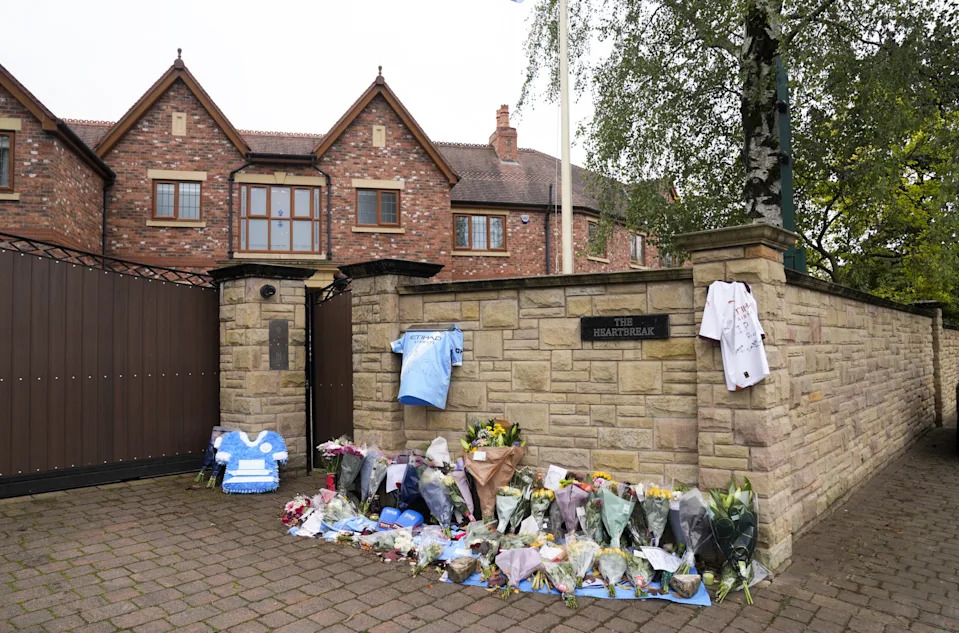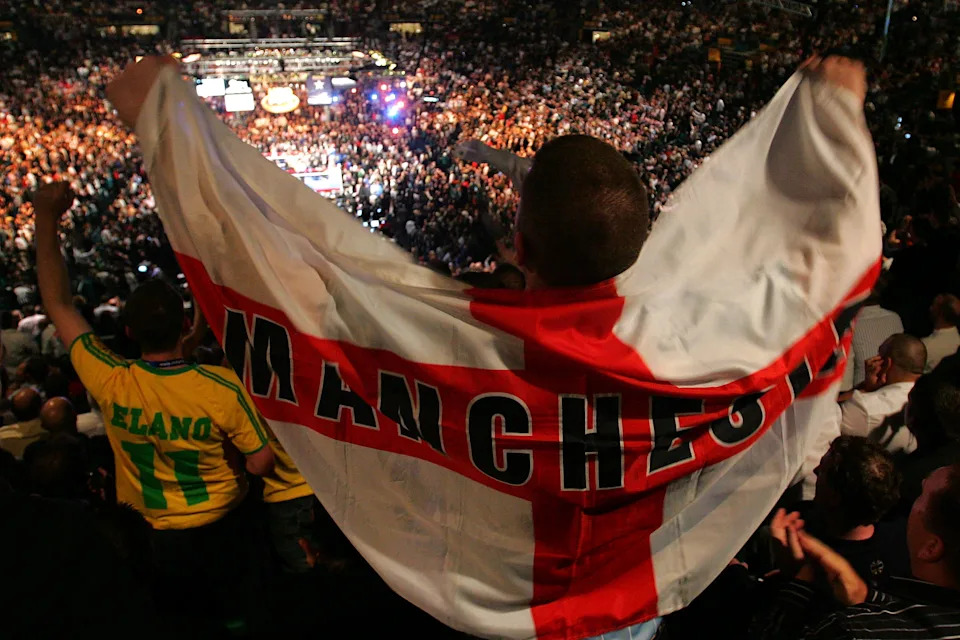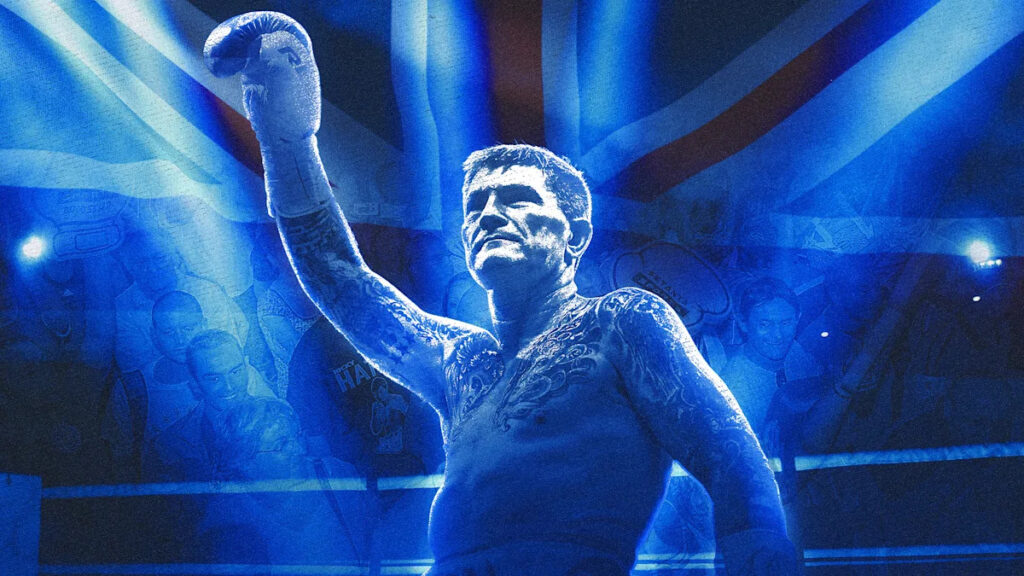The first time I saw Ricky Hatton fight live, I was 15 and he was 23. There were eight years between us and that, back then, seemed a lot. He was in a ring, the center of attention, and I was sitting with my dad in Row Z — watching, admiring, squinting. He had a spotlight and pressure on him, but he carried it well, Hatton. He seemed mature, grown up. He had a title and a son. He was a man. “The Hitman.” A man of the people. A proper man. Not like me, a boy.
When, on Sunday morning, the world received news of Ricky Hatton’s death, we were reminded of both his legacy and his age: 46. Though the difference between us was still eight years, he now didn’t seem that much older than me. In fact, now the difference in age was almost negligible. We could have even been friends, I thought. Somehow, he seemed younger at 46 than he was when I watched him fight live for the first time at 23. Somehow, life has a way of doing that to the retired boxer. Death just makes you aware of it.
The first time I saw Ricky Hatton fight live, we were so high up it was as much an auditory experience as a visual one. All around us, sitting in the nosebleeds, were Hatton fans narrating events through their shouts and their chants, and every punch Hatton landed was described by people whose view of it was obscured. They didn’t need to see it clearly to feel it, we learned. Up there, in the cheap seats, it was all feeling. They felt what he felt. Every punch. Every emotion.
Advertisement
We were “in the gods,” as they say. We were up high, like guardian angels, and the man we were tasked with overseeing was in these parts considered something close to a god. In the ring he required no protection. It was there he felt safe, at home, in control. Also, watched.
Against Ireland’s Eamonn Magee in 2002, Hatton was watched by 20,000 disciples inside the Manchester Arena, and most of them, save for the ones waving Irish tricolors, were living vicariously through him. In the aisles, which security tried in vain to keep clear, they stood and threw punches for him. Some threw the punches Hatton himself was at the time throwing, albeit with a delay; some threw punches to cope with nervous energy, and others threw the punches they thought would work against Magee. They all seemed to not only be experts in the Hatton style, but familiar with one another. It was less a fight night crowd than a regular church gathering. These people weren’t just boxing fans. They were Ricky Hatton fans. They had season tickets, membership cards. They followed him everywhere and traveled together. They also knew a stranger when they saw one.
Advertisement
“What are you doing here?” said one of them in Row Y, turning around to look at us.
It was a question asked no sooner than my dad, my brothers and I had taken our seats in Row Z, and was less threatening than it perhaps sounds. More inquisitive than threatening, the man who asked it had craned his neck to put faces to the voices behind him and then wanted to know how far we had traveled. So, with pride, my dad told him. He said the journey from south to north had taken almost four hours but refrained from using a word like “pilgrimage,” even if the word was both accurate and applicable. Certainly, to me, that’s what it felt like. By then, in 2002, it had become imperative to see Hatton fight in the flesh and experience being at the Manchester Arena for one of his bouts. By then each of us deemed traveling four hours by car to hear “Blue Moon” a small sacrifice. “That’s mad,” said the local, who presumably lived a stone’s throw from the arena. “You’ve come all this way to see Ricky.”
He was, of course, only ever Ricky to these people. It was never Hatton, Richard, or even “The Hitman.” Those names were used by others, but, with this lot, the disciples, it was Ricky first and foremost. They sat among Daves and Steves and Garys and Marks and they watched Ricky, their god, from on high. They watched their mate, one of their own, and they found comfort in knowing they were going through it together: The pain, the uncertainty, the eventual joy.
The fights were never easy, Hatton’s style guaranteed that, but that was all part of the fun. That’s why he needed them. That’s why they showed up for him every time and, by singing his name, let him know they would be ready whenever called upon.
June 1, 2002: Ricky Hatton (left) punishes challenger Eamonn Magee during their WBU junior welterweight title contest at the M.E.N. Arena in Manchester.
(Gareth Copley – PA Images via Getty Images)
The first time I saw Ricky Hatton fight live, the cavalry was called upon early — earlier than expected. That night Hatton’s seek-and-destroy style had for once backfired and he was dropped by Eamonn Magee’s right hook in Round 1. It marked the first time Hatton had been knocked down as a pro and the first genuine crisis he had encountered in an otherwise faultless pro career. It was also a shocking moment to witness in person. Suddenly, having been so loud, the arena had fallen silent as doubt — another stranger — entered our section, walked the aisles, and searched for a vacant seat.
Advertisement
As you would on a plane during turbulence, the urge was to now look for comfort in the eyes and expressions of other passengers. There, in the arena, the man in front of us would have spun his head around to see how we were doing, remembering we were now friends, and we would have seen the concern on his face he was trying to disguise. We would have also seen hope in it, as well as the same belief in Hatton each of his supporters possessed. “Come on, Ricky!” he and the rest would have said, as one. “Get up! Get into him!”
Never were they louder, these fans, than when their man was hurting or in trouble — that is, when he needed them. It was then that they rallied him and, even from so far away, tried bringing him to his feet with sheer volume and willpower.
Against Magee it worked. Hatton got up, he bravely battled back, and he dominated the 12 rounds they shared, much to the delight of those who had helped him rise. Yet in other fights, later fights, no amount of willing Hatton to get up would change the reality of a stark situation. In those moments the fans soon understood the limitations of their power and indeed their support. In those moments Hatton understood, despite the noise and the backing of his fans, what it meant to be alone.
That is a feeling most boxers experience at some stage in their career, only for Hatton the realization would have perhaps been more jarring than for most. After all, wherever he went, and whenever he fought, he was surrounded, adored. Just as we, the fans, were able to find comfort in numbers every time we made the pilgrimage to Manchester to see him box, the same was true of Hatton when setting foot inside the boxing ring. The noise, for him, was greater than it was for any other boxer in the sport’s recent history, yet that only made the silence so much louder when the noise inevitably stopped.

Tributes lay in memory of Ricky Hatton, who died Sunday at the age of 46.
(Danny Lawson – PA Images via Getty Images)
On fight night Ricky Hatton was loved, of that there is no doubt. He was loved by his friends and family at ringside, and he was loved by friends he had yet to meet sitting in cheap seats shouting his name until their voices gave out. Some of them had the same accent as him and supported the same soccer team, whereas others were, to him, complete strangers; people who sounded different and came from towns a Mancunian would struggle to locate on a map. But the one thing they all had in common, these supporters, was their love for Ricky Hatton. The fighter was someone they admired and the man was someone they felt they knew.
Advertisement
With a love like that, the distance between pew and pulpit hardly mattered. If you were there, you were there, and that’s all there was to it. In fact, it might even be said that you are never closer to a fighter than you are when watching them from Row Z. For it is there, in Row Z, you are a fan, unashamedly. You have paid for that seat. You have not been comped, or given a laminate, nor are you attending the fight because of some ersatz relationship with the fighter or the promoter. You are instead there because you want to watch them, you want to be in their presence, and because you want to share their success. There is, in boxing, no purity quite like it. You can in time get closer to the ring, and become emotionally invested in fighters who know your name, but seldom will that love be as strong or as pure as your first love.
Ricky Hatton, for me, was that first love. I watched every one of his fights, either on a television in my parents’ kitchen or from the cheapest seats they could afford, and it is thanks to him, Ricky Hatton, that I have my passion for the sport. It was one thing to just watch him fight — so visceral, so exciting, so dramatic — but it was something else to be a teenager and care so deeply about somebody you had never actually met.
On Sunday, the day we found out that Ricky Hatton had died, many were at the time busy eulogizing a superfight between Terence Crawford and Saul “Canelo” Alvarez in Las Vegas. It was there, in Las Vegas, Hatton and his legion of fans had enjoyed so many memorable nights, of course, and so it was only natural to think of those nights when news of his passing broke that morning. It was then almost comforting to focus on how Hatton had enriched the lives of all the men and women who had followed him to Las Vegas and how, in their memories, a part of Hatton will forever endure. They will see him as they saw him back then: Fit, ambitious, charismatic, a world champion. They will remember watching him fight. They will remember singing his song. They will remember what it all meant — to him, to them, to England. They will remember how it felt to care.

Dec. 8, 2007: Fans of England’s Ricky Hatton cheer him on before his bout against Floyd Mayweather Jr. for the WBC world welterweight championship in Las Vegas, Nevada.
(Ethan Miller via Getty Images)
Maybe, although we now mourn his passing, the truth is that we have been unconsciously mourning Hatton’s absence from the sport since he walked away from it in 2012. It was then that something within us, and within the sport, died. You might call it the loss of the ticket-seller, the working-class hero, or the one-city man, but whatever the correct term, it has seemingly gone, never to return.
Advertisement
Of this we see evidence whenever a big fight heads to Riyadh, Saudi Arabia, or takes place inside a stadium too large for any connection between fighter and fan to be formed. We see it, too, whenever an arena is full of fans just happy to see a devastating knockout they can capture on their phone, with no real feeling for or affinity with any of the boxers fighting for their respect in the ring. That feeling, it seems, left the sport around the time that Ricky Hatton accepted, with reluctance, he had given it all he could give. It is a feeling of togetherness and of belonging. It is a feeling of passion. It is a feeling I associate with one boxer more than any other.
This feeling, now bittersweet, returned on Sunday. That morning, Hatton’s passing was not just another death in boxing; it felt more like a death in the family. It forced you to stop whatever you were doing and seek comfort in others, people you didn’t even know. It made you want to be back at the Manchester Arena on a Hatton fight night — Saturday, around 10 o’clock. At least there, at the old M.E.N. Arena, you would be surrounded by familiar faces and familiar sounds. You could, as on fight night, perhaps even turn around in your seat and look to one of Hatton’s 20,000 supporters for reassurance. On their face you would detect how they felt and you would see that they felt the same way as you. “It’s OK,” they might say. Or: “It will be OK.”
Then, with encouraging shouts and chants, you would know — he would know — that he was loved and that nobody who ever watched him fight had stopped loving him, even if their attention may have waned or gone elsewhere. There would be some silence, yes, that is a sad reality of struggle, but this silence would be followed by that great roar for Hatton to get up, keep going, do his best. You would be reminded that there is only one of him, and so would he. You would also start to see one or two fans shadowboxing in the aisles — youngsters, perhaps — and know that regardless of his fate, his legacy will live on in the body-punching and up-jabs of the next generation. Some will adopt his style; some will take his nickname. But all will know his name. His name was Ricky. He was one of us.
Read the full article here



